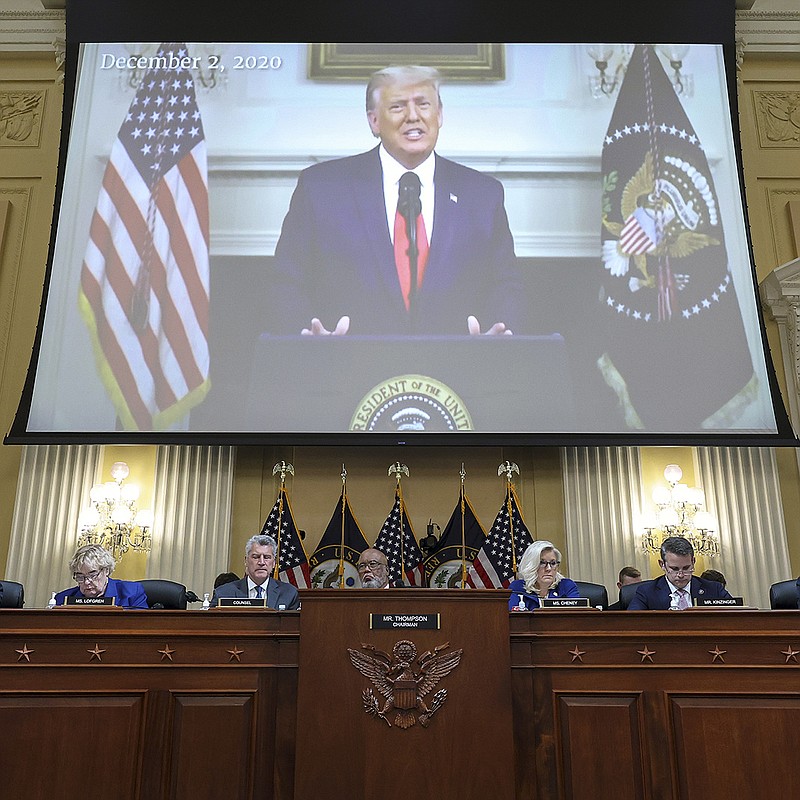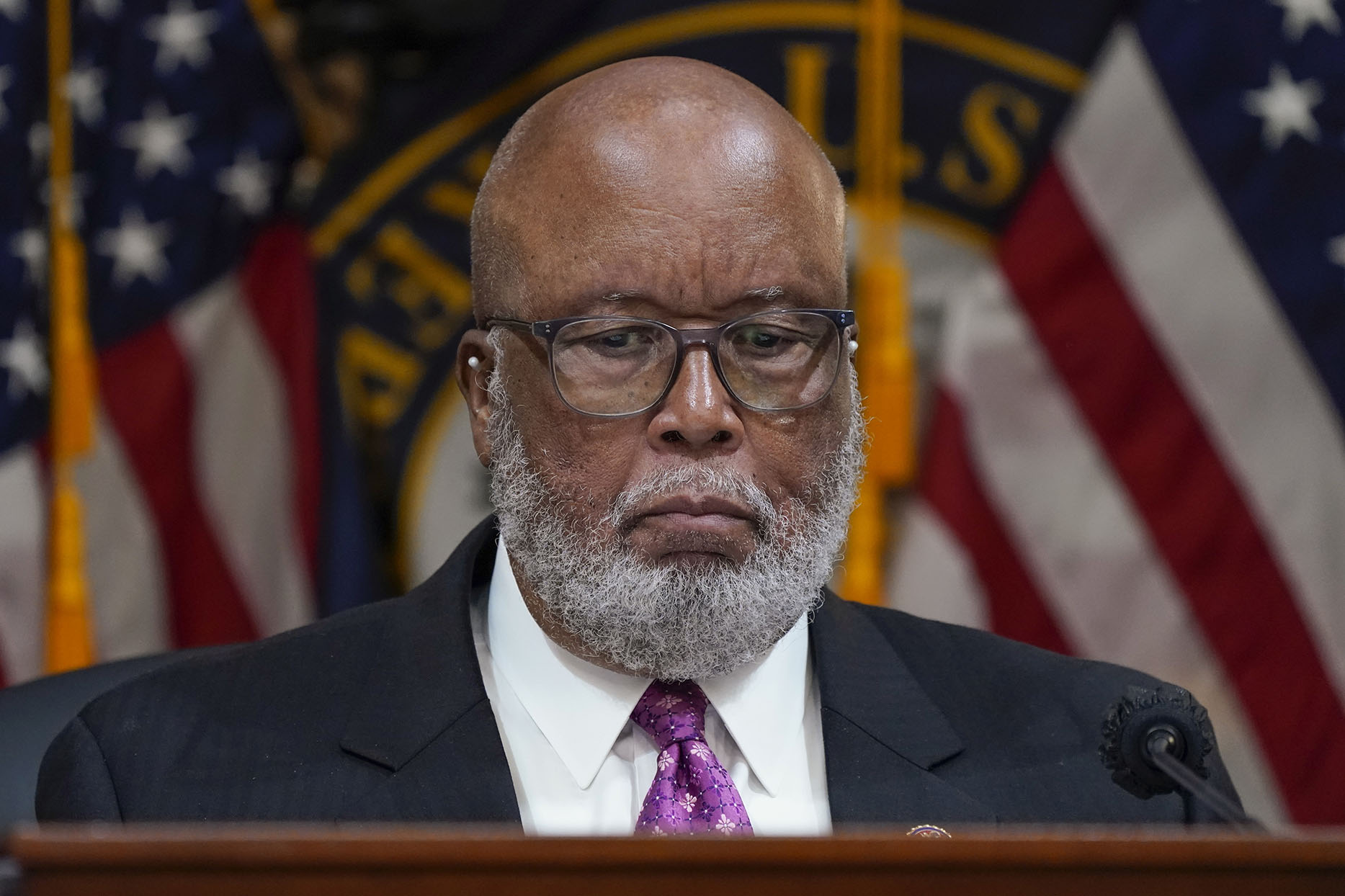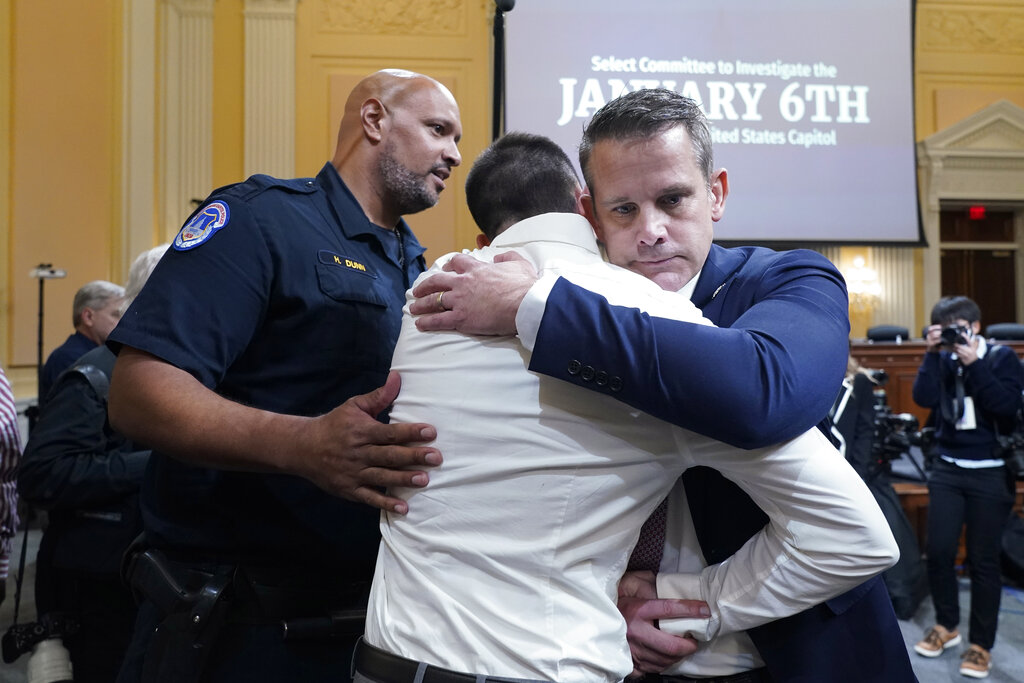The House committee investigating the Jan. 6, 2021, attack on the U.S. Capitol issued a surprise subpoena Thursday seeking testimony from former President Donald Trump, a move that panel members said was a necessary final act before the panel concludes its work.
The unanimous vote came at the end of the committee's ninth and likely final public hearing, a session intended as a closing argument to the panel's 14-month investigation.
Combining a mix of new evidence gathered by the committee since July and testimony played at previous sessions, the hearing aimed to bolster a conclusion that members have hammered again and again: that the violence on Jan. 6 was the direct and predictable result of Trump's choices in the weeks after he lost his bid for reelection.
But even after interviews with more than 1,000 witnesses and reviews of hundreds of thousands of documents, Rep. Liz Cheney, R-Wyo., the panel's vice chair, said the inquiry's work is incomplete without hearing answers from "January 6th's central player."
"Every American is entitled to those answers," she said.
Trump immediately assailed the panel's work, and experts said the subpoena is unlikely to succeed in forcing him to testify without a lengthy court battle that would last into next year, when Republicans might take over the House.
But the vote -- which committee Chairman Bennie Thompson, D-Miss., cast as an "obligation" that will help ensure "nothing like January 6th ever happens again" -- marked a dramatic punctuation to the 2½-hour session.
Among the revelations presented by the committee on Thursday was a memo suggesting that the plan for Trump to declare the election stolen should he lose was a premeditated strategy hatched even before voters went to the polls.
The committee also provided new evidence that Trump privately understood voters had rejected his reelection bid, including by ordering a likely chaotic immediate withdrawal of U.S. troops from Afghanistan and Somalia just four days after news organizations called the race for Joe Biden.
And committee members displayed emails and other messages that showed the U.S. Secret Service was repeatedly warned of the possibility of violence before Jan. 6 -- and that Trump persisted in pushing to join the mob as it besieged the U.S. Capitol later into the afternoon than was previously known.
Experts said the committee faces several hurdles in attempting to force Trump to testify about those and other subjects. The former president could fight the subpoena in court, arguing that Congress cannot compel testimony from the executive. Win or lose, that kind of court battle would likely drag into the new year, when the committee could be disbanded should Republicans win control of the House in midterm elections next month.
Even if he appeared, Trump could refuse to answer questions by invoking his Fifth Amendment right against self-incrimination. That is a path that 30 other witnesses have taken, Cheney said. And two other Trump aides ignored committee subpoenas entirely: Steve Bannon, who was convicted of contempt in July, and Peter Navarro, who will go on trial for contempt next month.
But Cheney, who lost her bid for reelection amid GOP anger over her leadership role on the panel, said the committee needs to try "so we can act now to protect our republic."
"We are obligated to seek answers directly from the man who set this all in motion," she said.
Trump responded to the committee's action on the social media site Truth Social, writing: "Why didn't the Unselect Committee ask me to testify months ago? Why did they wait until the very end, the final moments of their last meeting? Because the Committee is a total 'BUST' that has only served to further divide our Country which, by the way, is doing very badly - A laughing stock all over the World?"
Thompson told reporters after the hearing that the committee needed to gather evidence first before deciding Trump's testimony was necessary. "I think everything we've shown -- especially in this hearing and in some early hearings -- show that he was complicit," he said.
The committee has signaled that Thursday's hearing was likely its last and was intended to serve as a public summation of its work, which will also be compiled in a written report to be released before the end of the year.
The hearing was the first since a round of sessions held in June and July that dominated headlines for weeks with striking new details about Trump's actions before and during the attack.
But the political landscape has shifted considerably since those hearings. Midterm elections in which Democrats could lose control of the House now loom. Both parties expect the committee to be disbanded and its work abandoned should Republicans win the House, putting a ticking clock on the committee to conclude its work. Cheney's defeat in an August primary by more than 37 percentage points served as a striking reminder that the GOP remains solidly behind Trump.
Meanwhile, there have been new public indications that the Justice Department is conducting a wide-ranging criminal investigation of how Trump and his advisers handled the postelection period. An FBI search of Trump's Florida Mar-a-Lago Club revealed that the former president's more urgent legal liability may stem from a separate matter -- how he handled classified documents after leaving office.
TRUMP'S MINDSET
Leaning heavily on the accounts of Trump's aides and allies, the Jan. 6 committee has showed that Trump was informed repeatedly that he had lost but clung to conspiracy theories and falsehoods to deny reality. He then pressured Republican officeholders, government agencies including the Justice Department and even his own vice president to take unprecedented and potentially illegal steps to help him remain in office.
To describe the president's mindset, the committee presented new and previously seen material, including interviews with Trump's top aides and Cabinet officials -- including Secretary of State Mike Pompeo, Attorney General William Barr and Labor Secretary Eugene Scalia -- in which some described the president acknowledging he had lost.
Ex-White House official Alyssa Farah Griffin said Trump once looked up at a television and said, "Can you believe I lost to this (expletive) guy?"
Cabinet members also said in interviews shown at the hearing that they believed that once legal avenues had been exhausted, that should have been the end of Trump's efforts to remain in power.
"In my view, that was the end of the matter," Barr said of the Dec. 14 vote of the Electoral College.
But rather than the end of Trump's efforts, it was only the beginning -- as the president summoned the crowd to Washington on Jan. 6.
The panel showed clips of Trump at his rally near the White House that day saying the opposite of what he had been told. He then tells supporters he will march with them to the Capitol. That never happened.
"There is no defense that Donald Trump was duped or irrational," said Cheney. "No president can defy the rule of law and act this way in our constitutional republic, period."
Evidence presented by the committee Thursday demonstrated that Trump and his allies had a premeditated plan to call the election stolen should he lose, developed before voters even went to the polls. One memo sent to Trump by an ally on Oct. 31 -- four days before the election -- suggested he should announce after polls closed: "We had an election today and I won."
SECRET SERVICE EMAILS
The most significant new evidence laid out by the committee Thursday was drawn from roughly 1 million emails and other documents turned over by the Secret Service in recent weeks, including an email from Dec. 11, 2020, the day the Supreme Court rejected one of the main lawsuits Trump's team had brought against the election results.
"Just fyi. POTUS is p*****," the Secret Service message said.
They arrived after the committee discovered that internal text messages exchanged by agents that day had been deleted. (Officials have said the deletions were part of a routine purge as Trump's term ended.)
The documents showed that the Secret Service received repeated warnings of possible violence on Jan. 6 in the weeks before thousands of Trump supporters came to Washington to protest his election loss.
Some of that evidence appeared designed to bolster the committee's star witness, Cassidy Hutchinson, who served as an aide to Trump's chief of staff, Mark Meadows. Hutchinson testified in June that she overheard the president lashing out at staff over the apparently lackluster crowd in front of the podium, and urging that his supporters be allowed through magnetometers even though he had been informed that some of them had weapons.
"'They're not here to hurt me. Take the f****** mags away. Let my people in,'" Hutchinson testified that she overheard the president say.
The committee on Thursday presented internal messages from the Secret Service showing agents had noticed how many protesters appeared hesitant to walk through the metal detectors and speculated at the time that it was because they were armed.
Despite evidence of brewing violence, Trump still exhorted the crowd to march on Congress -- and angrily pressed for agents to drive him to the Capitol so he could lead the way.
Newly revealed emails showed that a Secret Service official wrote that agency leaders remained "concerned" Trump would demand to be taken to the Capitol as late as 1:19 p.m., as the crowds were starting to besiege the building. Only at 1:55 p.m. did the emails show that agents were at last told they could stand down.
VIDEO OF LAWMAKERS
The committee has previously tracked how Trump spent hours that afternoon watching the violence unfold on television at the White House and refusing entreaties that he speak out and call for peace. Congressional leaders, meanwhile, reacted far differently, according to a video aired for the first time Thursday.
The footage, shot by Democratic House Speaker Nancy Pelosi's daughter, documentary filmmaker Alexandra Pelosi, showed the speaker and other leaders, including Republicans, working the phones through the afternoon to coordinate more police and National Guard response and discussing how to get Congress back to work to complete the certification of Biden's victory.
The video captured the moment in the early afternoon when Pelosi, evacuated from the House floor, was informed that members of the House were being instructed to don gas masks in preparation for a breach by rioters.
Pelosi stood shocked for a moment, then muttered, "Do you believe this?"
Pelosi can be seen on a call with the governor of neighboring Virginia, explaining as she shelters with Senate Democratic leader Charles Schumer and others that the governor of Maryland has also been contacted. Later, the video shows Senate Republican Leader Mitch McConnell and other GOP leaders as the group asks the Defense Department for help.
"They're breaking the law in many different ways," Pelosi says at one point. "And quite frankly, much of it at the instigation of the president of the United States."
Hours later, Pelosi could be seen speaking to Vice President Mike Pence on speaker phone as Pence informed her that security would soon clear the building, allowing Congress to return to action. "Thank you very much, Mr. Vice President. Good news," she responded.
The committee closed its hearing with a roll-call vote to subpoena the former president, with each of the panel's seven Democrats and two Republicans voting "aye."
Stanley Brand, former counsel to the House of Representatives, said there are few precedents for congressional subpoenas to sitting or former presidents.
"It raises a host of issues, constitutional and otherwise. Beyond the merits and the question of subpoenaing a former president, how are you ever going to enforce it?" he said, describing the move as largely "symbolic" and unlikely to be enforced before the committee is disbanded.
Stephen Gillers, a professor of constitutional law at New York University, said he, too, believed it was improbable the subpoena would be enforced. Still, he viewed the move as a "formal invitation" to Trump to respond to the committee's findings before it concludes its work.
The session likely marked Cheney's last appearance on the dais for work that she has described as the most important of her public life.
With weeks to go before a midterm election in which hundreds of Republican nominees who have questioned or denied the legitimacy of the 2020 vote will appear on the ballot, she gave an impassioned speech imploring Americans to take seriously the evidence the committee has compiled.
"Please consider where our nation is in its history," she said. "Consider whether we can survive for another 246 years. Most people in most places on Earth have not been free.
"America is an exception," she said. "And America continues only because we bind ourselves to our founders' principles, to our Constitution."
Information for this article was contributed by Rosalind S. Helderman, Jacqueline Alemany, Tom Hamburger, Carol D. Leonnig and Josh Dawsey of The Washington Post and by Lisa Mascaro, Farnoush Amiri, Eric Tucker, Mary Clare Jalonick, Jill Colvin, Kevin Freking and Michael Balsamo of The Associated Press.
Gallery: House's January 6 panel meets, 10-13-22


